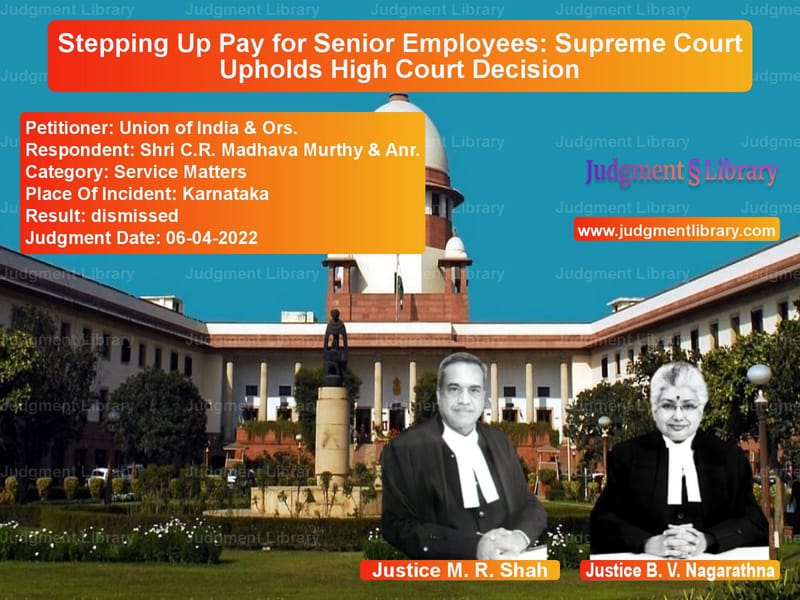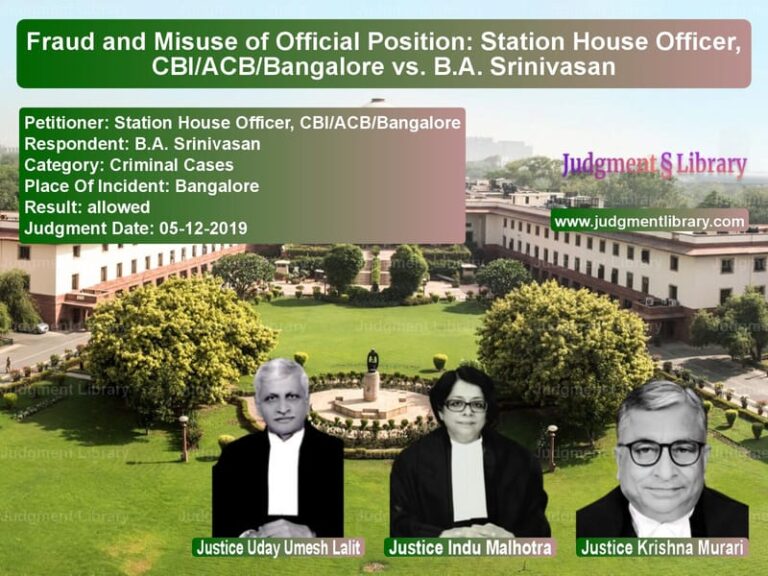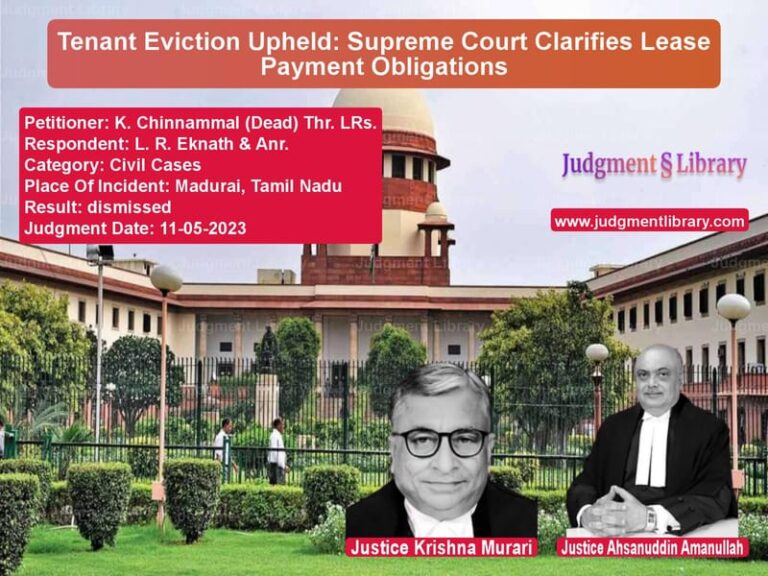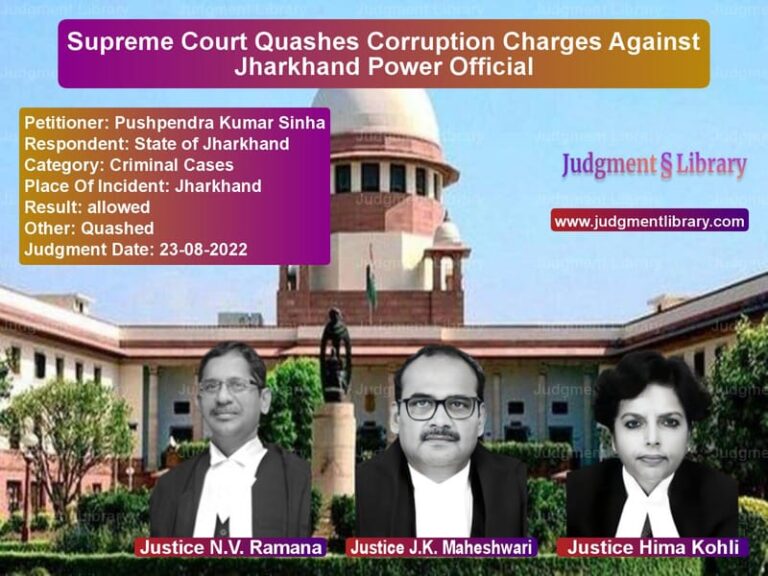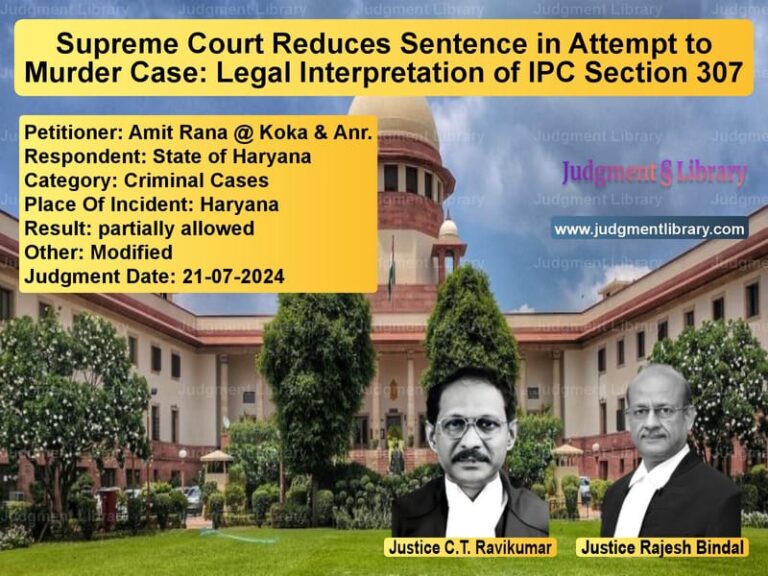Stepping Up Pay for Senior Employees: Supreme Court Upholds High Court Decision
The Supreme Court of India recently ruled on the case of Union of India & Ors. vs. Shri C.R. Madhava Murthy & Anr., which addressed the issue of pay anomalies in government service due to the implementation of the Assured Career Progression (ACP) Scheme. The case revolved around whether senior employees were entitled to have their pay stepped up when their juniors, due to upgradation under the ACP Scheme, received higher pay.
Background of the Case
The respondents, Shri C.R. Madhava Murthy and another, were originally appointed as Lower Division Clerks in 1973. Over the years, they received promotions and were eventually appointed as Inspectors in the Central Excise and Customs Department. In contrast, certain other employees, including Shri C.K. Satish and Shri B.S. Srikanth, were appointed as Inspectors through direct recruitment in 1981 and 1982, respectively.
In 1999, the government introduced the Assured Career Progression (ACP) Scheme to address stagnation in promotions. This scheme allowed employees who had not received a promotion within a certain time frame to be given financial upgradation. As a result, the juniors of the respondents were granted higher pay under the ACP Scheme than the respondents themselves, even though the respondents had been promoted through the normal route.
Read also: https://judgmentlibrary.com/larsgess-scheme-and-employment-rights-supreme-courts-final-verdict/
The respondents filed representations seeking stepping up of their pay to remove this anomaly. However, their requests were denied. Consequently, they approached the Central Administrative Tribunal (CAT), which also ruled against them. Dissatisfied, they filed writ petitions in the Karnataka High Court.
High Court Ruling
The Karnataka High Court allowed the writ petitions and directed the Union of India to step up the pay of the respondents, ensuring that they received at least as much as their juniors who had benefited from the ACP Scheme. The Union of India then appealed this decision before the Supreme Court.
Legal Issues
- Whether senior employees, who were promoted through normal channels, were entitled to have their pay stepped up to match their juniors who received higher pay due to financial upgradation under the ACP Scheme.
- The interpretation of Fundamental Rule 22 (FR 22) regarding pay anomalies and stepping up of pay.
- Whether the government was obligated to rectify anomalies created by its own upgradation schemes.
Arguments by the Parties
Union of India’s Arguments
- The appellants argued that the ACP Scheme was meant to provide relief to employees who had faced stagnation and was not a mechanism to grant promotions.
- They contended that employees who had already been promoted were not entitled to additional financial upgradation under the ACP Scheme.
- The government maintained that the High Court had misinterpreted the purpose of the ACP Scheme by equating it with regular promotions.
Respondents’ Arguments
- The respondents argued that they were being paid less than their juniors due to the implementation of the ACP Scheme, which was an unfair anomaly.
- They cited Fundamental Rule 22 (FR 22), which provides that a senior officer should not receive less pay than their junior under identical circumstances.
- They emphasized that their demand was not for ACP benefits but rather for the correction of an unfair anomaly where a junior was drawing higher pay than a senior.
Supreme Court’s Judgment
Key Observations
- The Court noted that the respondents were not claiming the benefits of the ACP Scheme but were merely seeking removal of an anomaly where their juniors, due to financial upgradation, were drawing higher pay.
- It observed that under FR 22, the government is obligated to remove anomalies where seniors are receiving lower pay than their juniors in the same cadre.
- The judgment emphasized that the ACP Scheme was designed to address stagnation but should not result in pay disparities that unfairly disadvantage senior employees.
Final Decision
The Supreme Court dismissed the appeal of the Union of India and upheld the Karnataka High Court’s ruling, stating:
“It was a case where a junior was drawing more pay on account of upgradation under the ACP Scheme, creating an anomaly, and therefore, the pay of the senior was required to be stepped up.”
The Court directed the government to implement the stepping up of pay immediately, ensuring that the respondents’ pay was brought on par with their juniors from the date the anomaly arose.
Implications of the Judgment
For Government Employees
- This ruling clarifies that employees who are promoted through normal channels should not be financially disadvantaged due to government-implemented financial upgradation schemes.
- It ensures that seniors do not face salary disparities simply because their juniors received higher pay due to ACP or MACP (Modified Assured Career Progression) upgradations.
For Government Departments
- Departments must review pay structures periodically to ensure anomalies caused by financial upgradation schemes are addressed.
- Authorities must ensure compliance with FR 22, stepping up pay where required to prevent unjust disparities.
For Future Pay Fixation Policies
- The judgment highlights the importance of fair pay policies that do not create unintended disadvantages for senior employees.
- It may lead to changes in how financial upgradations are implemented to avoid similar disputes.
Conclusion
The Supreme Court’s ruling in Union of India & Ors. vs. Shri C.R. Madhava Murthy & Anr. is a significant decision ensuring fair pay structures in government employment. By upholding the Karnataka High Court’s order, the Court reaffirmed that pay anomalies caused by financial upgradations must be rectified to maintain parity between senior and junior employees. This decision strengthens employee rights and provides clarity on how government pay structures should be managed in cases of financial upgradation schemes.
Petitioner Name: Union of India & Ors..Respondent Name: Shri C.R. Madhava Murthy & Anr..Judgment By: Justice M. R. Shah, Justice B. V. Nagarathna.Place Of Incident: Karnataka.Judgment Date: 06-04-2022.
Don’t miss out on the full details! Download the complete judgment in PDF format below and gain valuable insights instantly!
Download Judgment: union-of-india-&-ors-vs-shri-c.r.-madhava-mu-supreme-court-of-india-judgment-dated-06-04-2022.pdf
Directly Download Judgment: Directly download this Judgment
See all petitions in Employment Disputes
See all petitions in Promotion Cases
See all petitions in Public Sector Employees
See all petitions in Judgment by Mukeshkumar Rasikbhai Shah
See all petitions in Judgment by B.V. Nagarathna
See all petitions in dismissed
See all petitions in supreme court of India judgments April 2022
See all petitions in 2022 judgments
See all posts in Service Matters Category
See all allowed petitions in Service Matters Category
See all Dismissed petitions in Service Matters Category
See all partially allowed petitions in Service Matters Category

